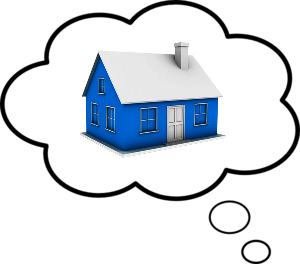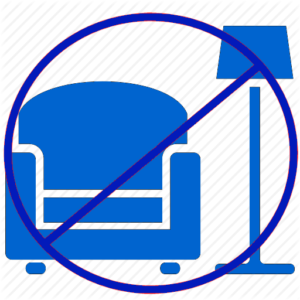 Think long-term and think re-sale: Are you planning to have kids? Will you be taking care of elderly relatives? You might be planning to live in your first home for only a few years. In that case, who is your target audience when it comes time to sell the house? If you buy a house in a very bad school district or a house on a very busy street, when you are ready to sell the house, most families with children will be out of your list of potential buyers. Think long-term and think re-sale: Are you planning to have kids? Will you be taking care of elderly relatives? You might be planning to live in your first home for only a few years. In that case, who is your target audience when it comes time to sell the house? If you buy a house in a very bad school district or a house on a very busy street, when you are ready to sell the house, most families with children will be out of your list of potential buyers.
 Make a list of items to check: Make a checklist of your must-haves, nice-to-haves and other essentials. Then print copies of this checklist. Every time you visit a house, take the checklist along with you; take photographs so you can cross each item off your list. If you fall in love with the house and your checklist shows that the house has none of your must-haves, it will at least make you pause and think. Make a list of items to check: Make a checklist of your must-haves, nice-to-haves and other essentials. Then print copies of this checklist. Every time you visit a house, take the checklist along with you; take photographs so you can cross each item off your list. If you fall in love with the house and your checklist shows that the house has none of your must-haves, it will at least make you pause and think.
 Look at ALL the expenses when you are budgeting for the house: When budgeting for the house, don’t stop with principal, interest, taxes and insurance; add in utilities, cost of commuting and upgrades. Call the utility companies that service the house you are considering and ask for an estimate of what the cost will be, whether there are any budget plans available, etc. Budget all of these expenses and see if you can still afford the house. Look at ALL the expenses when you are budgeting for the house: When budgeting for the house, don’t stop with principal, interest, taxes and insurance; add in utilities, cost of commuting and upgrades. Call the utility companies that service the house you are considering and ask for an estimate of what the cost will be, whether there are any budget plans available, etc. Budget all of these expenses and see if you can still afford the house.
 Ask for the homeowners association contract before you make a decision: Once you identify the neighborhood you find most desirable, ask for a copy of the HOA contract after going to an open house in that area. If you’re buying a house that is part of an HOA, it’s essential to read the HOA contract before doing anything else. Ask for the homeowners association contract before you make a decision: Once you identify the neighborhood you find most desirable, ask for a copy of the HOA contract after going to an open house in that area. If you’re buying a house that is part of an HOA, it’s essential to read the HOA contract before doing anything else.
 Research grants and other sources of funding: There are many different options based on profession (grants for teachers, farmers, etc.) as well as the area of the potential house (whether it’s in a rural area, high-poverty area, etc.) Research all the grants and funding options you are eligible for before you automatically decide you won’t qualify for anything. Research grants and other sources of funding: There are many different options based on profession (grants for teachers, farmers, etc.) as well as the area of the potential house (whether it’s in a rural area, high-poverty area, etc.) Research all the grants and funding options you are eligible for before you automatically decide you won’t qualify for anything.
 Be sure to read your contract before you sign it: A house is probably the largest purchase you will ever make in your life, so make sure you understand the terms of your contract. If you don’t understand any of the terms, ask your mortgage broker and your real estate agent. If they won’t explain the terms clearly to you, fire them; there are enough people who will be more than happy to help you and work for your business. Be sure to read your contract before you sign it: A house is probably the largest purchase you will ever make in your life, so make sure you understand the terms of your contract. If you don’t understand any of the terms, ask your mortgage broker and your real estate agent. If they won’t explain the terms clearly to you, fire them; there are enough people who will be more than happy to help you and work for your business.
 Learn about the neighborhood demographics: If you are buying a house in a neighborhood full of renters, it only takes a few bad renters or bad landlords to drive the neighborhood down fast. If the neighborhood is full of single people, will you be happy there if you have very young kids? Learn about the neighborhood demographics: If you are buying a house in a neighborhood full of renters, it only takes a few bad renters or bad landlords to drive the neighborhood down fast. If the neighborhood is full of single people, will you be happy there if you have very young kids?
 If you like the view, buy it: Buy the view, not the house. However, unless you own the land between your house and the view, don’t buy a house for the view. If you like the view, buy it: Buy the view, not the house. However, unless you own the land between your house and the view, don’t buy a house for the view.
 Look beyond the staging: Staged houses look far better than houses that are still being occupied. When you are considering a house, mentally try to remove the staging. Pay more attention to the layout of the house and the structure itself. Ugly wallpaper and paint can be easily fixed later. Look beyond the staging: Staged houses look far better than houses that are still being occupied. When you are considering a house, mentally try to remove the staging. Pay more attention to the layout of the house and the structure itself. Ugly wallpaper and paint can be easily fixed later.
 All the old advice about buying your first home is true. Some examples — have an emergency fund, save for a down payment of 20 percent, get your credit into a better shape and don’t buy more than you can afford. All the old advice about buying your first home is true. Some examples — have an emergency fund, save for a down payment of 20 percent, get your credit into a better shape and don’t buy more than you can afford.
|
 Think long-term and think re-sale: Are you planning to have kids? Will you be taking care of elderly relatives? You might be planning to live in your first home for only a few years. In that case, who is your target audience when it comes time to sell the house? If you buy a house in a very bad school district or a house on a very busy street, when you are ready to sell the house, most families with children will be out of your list of potential buyers.
Think long-term and think re-sale: Are you planning to have kids? Will you be taking care of elderly relatives? You might be planning to live in your first home for only a few years. In that case, who is your target audience when it comes time to sell the house? If you buy a house in a very bad school district or a house on a very busy street, when you are ready to sell the house, most families with children will be out of your list of potential buyers.

 Look at ALL the expenses when you are budgeting for the house: When budgeting for the house, don’t stop with principal, interest, taxes and insurance; add in utilities, cost of commuting and upgrades. Call the utility companies that service the house you are considering and ask for an estimate of what the cost will be, whether there are any budget plans available, etc. Budget all of these expenses and see if you can still afford the house.
Look at ALL the expenses when you are budgeting for the house: When budgeting for the house, don’t stop with principal, interest, taxes and insurance; add in utilities, cost of commuting and upgrades. Call the utility companies that service the house you are considering and ask for an estimate of what the cost will be, whether there are any budget plans available, etc. Budget all of these expenses and see if you can still afford the house. Ask for the homeowners association contract before you make a decision: Once you identify the neighborhood you find most desirable, ask for a copy of the HOA contract after going to an open house in that area. If you’re buying a house that is part of an HOA, it’s essential to read the HOA contract before doing anything else.
Ask for the homeowners association contract before you make a decision: Once you identify the neighborhood you find most desirable, ask for a copy of the HOA contract after going to an open house in that area. If you’re buying a house that is part of an HOA, it’s essential to read the HOA contract before doing anything else. Be sure to read your contract before you sign it: A house is probably the largest purchase you will ever make in your life, so make sure you understand the terms of your contract. If you don’t understand any of the terms, ask your mortgage broker and your real estate agent. If they won’t explain the terms clearly to you, fire them; there are enough people who will be more than happy to help you and work for your business.
Be sure to read your contract before you sign it: A house is probably the largest purchase you will ever make in your life, so make sure you understand the terms of your contract. If you don’t understand any of the terms, ask your mortgage broker and your real estate agent. If they won’t explain the terms clearly to you, fire them; there are enough people who will be more than happy to help you and work for your business. Learn about the neighborhood demographics: If you are buying a house in a neighborhood full of renters, it only takes a few bad renters or bad landlords to drive the neighborhood down fast. If the neighborhood is full of single people, will you be happy there if you have very young kids?
Learn about the neighborhood demographics: If you are buying a house in a neighborhood full of renters, it only takes a few bad renters or bad landlords to drive the neighborhood down fast. If the neighborhood is full of single people, will you be happy there if you have very young kids? Look beyond the staging: Staged houses look far better than houses that are still being occupied. When you are considering a house, mentally try to remove the staging. Pay more attention to the layout of the house and the structure itself. Ugly wallpaper and paint can be easily fixed later.
Look beyond the staging: Staged houses look far better than houses that are still being occupied. When you are considering a house, mentally try to remove the staging. Pay more attention to the layout of the house and the structure itself. Ugly wallpaper and paint can be easily fixed later.